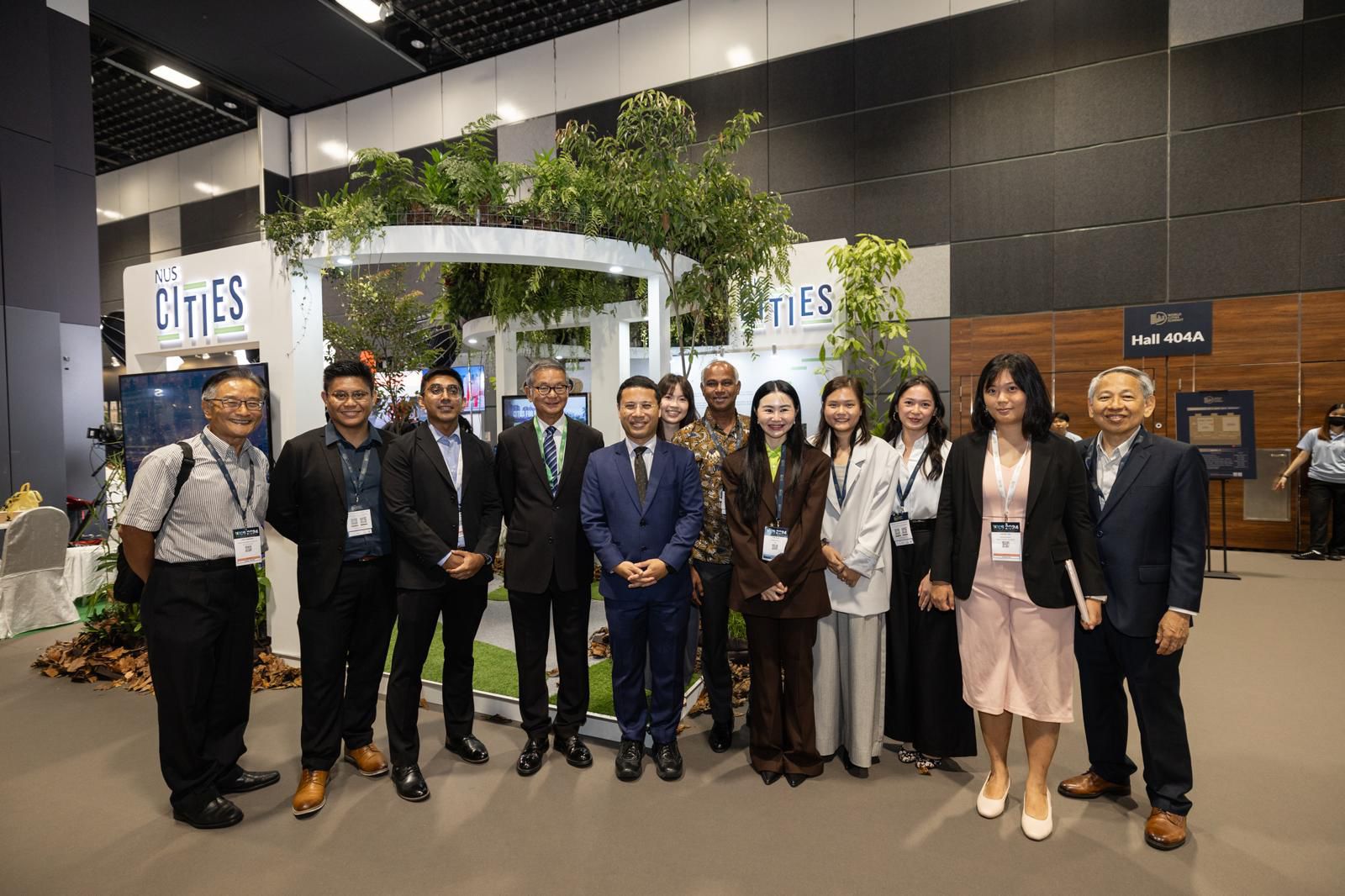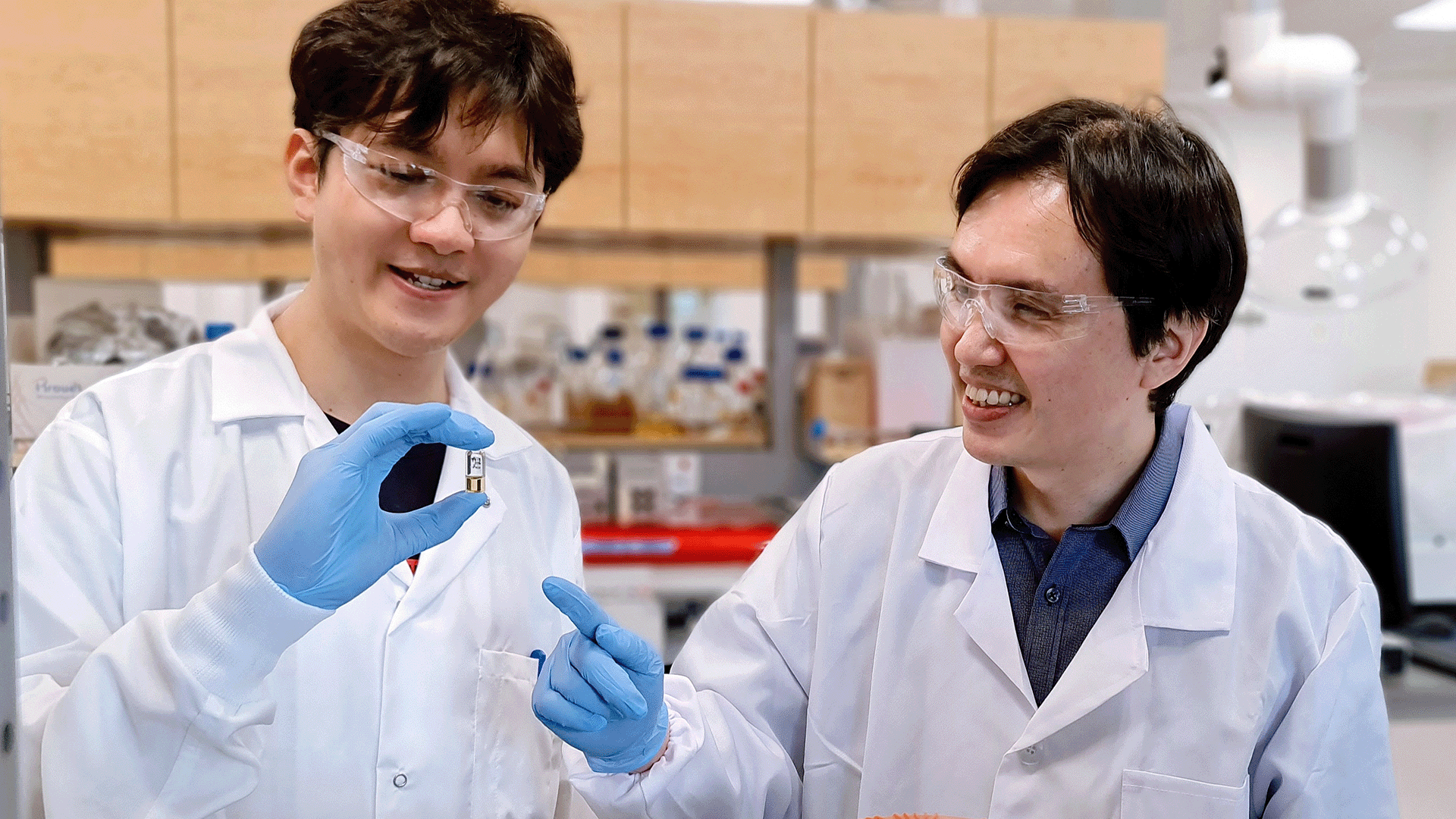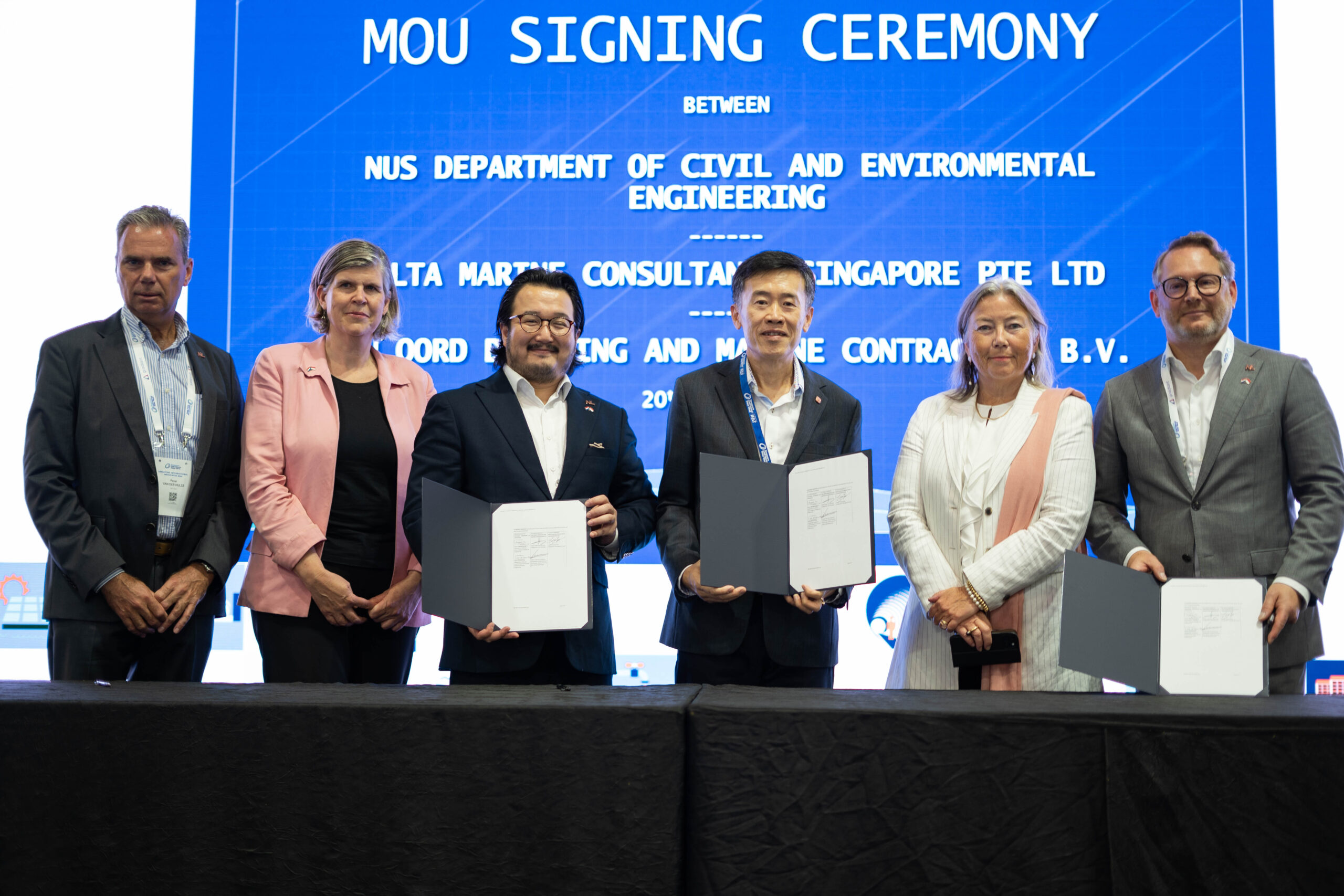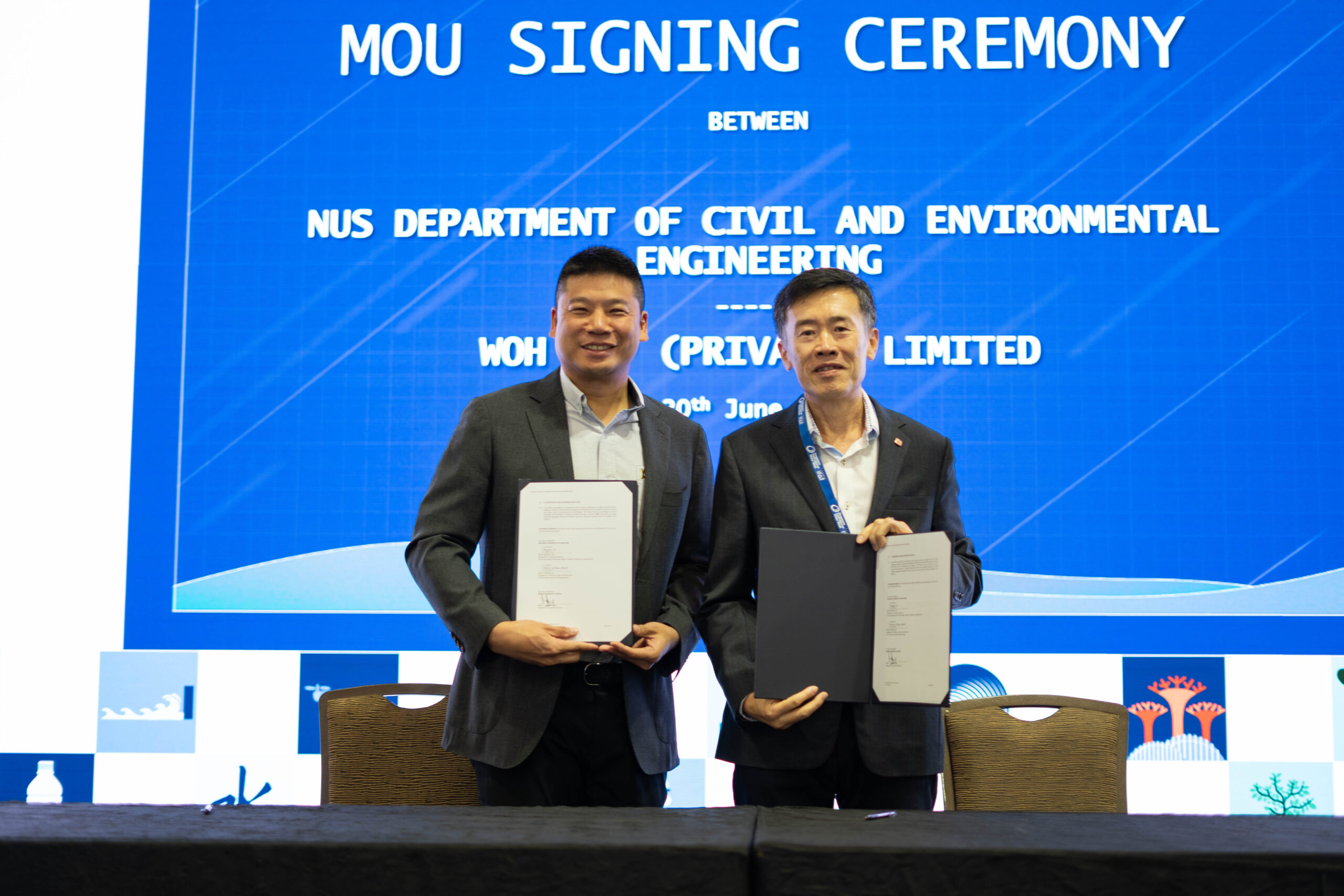RESEARCH IMPACT & COLLABORATIONS
NUS Cities at World Cities Summit

NUS Cities was at the World Cities Summit which took place from 2-4 June 2024.
The biennial World Cities Summit is an exclusive platform for government leaders and industry experts to address liveable and sustainable city challenges, share integrated urban solutions and forge new partnerships. Jointly organised by Singapore’s Centre for Liveable Cities (CLC) and the Urban Redevelopment Authority (URA), key highlights of the Summit included the WCS Mayors Forum, the Lee Kuan Yew World City Prize and the WCS Young Leaders Symposium.
Among the projects presented by NUS Cities were:
- High fidelity CFD simulation and field measurement: Sensing and shaping air flow to mitigate heat for improving climate resilience in high-density coastal cities - Associate Profesor Yuan Chao, Department of Architecture
- Greenery cooling effect modelling tool: Effects of tree plantings with varying street aspect ratios on the thermal environment using a mechanistic urban canopy model - PhD Student (Urban Climate Design Lab) Taihan Chen
- Urban wind environment assessment: The impact of natural urban terrain on urban wind environment in high-density neighbourhoods - Research Assistant (Urban Climate Design Lab) Tanya Talwar
- Greenery and Urban Design: Cooling capacity of urban vegetation with diverse densities and spatial patterns in tropical cities - Research Assistant (Urban Climate Design Lab) Liqing Zhang
- Microclimate digital platform - Urban Climate Design Lab, Department of Architecture
Check out all the NUS Cities happenings at https://www.linkedin.com/company/nus-cities/.
CFI Singapore at Singapore International Water Week
CFI Singapore presented nine Tranche 1 research projects at the Singapore International Water Week (SIWW), which took place from 18-22 June. More than 30,000 trade visitors were expected to attend SIWW 2024, making it one of the largest expos tackling urban water and associated climate challenges.
CFI Singapore is a key pillar under PUB's National Water Agency’s S$125 million Coastal Protection and Flood Management Research Programme (CFRP), which galvanises research and technology development in coastal protection and flood management. Established as a multi-institutional, interdisciplinary research centre, CFI Singapore brings together the strengths of various local universities, research institutes and industry partners.
The nine interdisciplinary projects involve faculty and researchers across NUS, Nanyang Technological University (NTU) and the Singapore Institute of Technology (SIT).
Check out the CFI Singapore brochure and project info sheets at CFI ISSUU Stack.
PUB announced Tranche 2 projects that were awarded under CFI Singapore at SIWW. More details at: https://www.pub.gov.sg/-/media/PUB/Resources/Press-Releases/2024/06/Annex-A_Tranche-2-Research-Projects-Awarded-Under-CFI-Singapore.pdf
CDE projects showcased at the NUS Pavillion at SIWW 2024

Led by the NUS Environmental Research Institute (NERI), NUS researchers presented an impressive suite of projects at this year’s Singapore International Water Week (SIWW), which was held at the Marina Bay Sands Expo and Convention Centre and open to the public from 19 to 22 June.
Among the projects presented by CDE faculty and researchers were:
Harvesting solar energy while optimising crop cultivation for tropical buildings
In pilot experiments, Dr Terrence Tan and his team from the Department of Architecture found that edible crops could still grow well despite being partially covered by solar PV cells. The research team aims to scale up the prototype for testing on NUS campus to optimise the overall yield and placement of the PV pattern. This project demonstrates how urban structures in Singapore and the region can be transformed into self-sustaining ecosystems, contributing to food security and renewable energy generation.
Transforming food waste into valuable ‘feedstock’ for microalgae cultivation
Assistant Professor Iris Yu and her team from NERI and the Department of Civil and Environmental Engineering (CEE) are developing an integrated microwave-microalgae reactor to upcycle food waste into useful compounds. The team’s initial research showed that the resulting product, or derivative, can be used as a growth medium for microalgae by applying low-energy microwave pulses on organic refuse such as food waste. Microalgae are natural CO2 absorbers and can be subsequently harvested to produce biofuels, animal feed, and other high-value bioproducts. The outcome is a dual-benefit system where food waste is converted into valuable bioproducts, such as biofuels and pharmaceuticals. This could also potentially reduce the volume of waste entering the limited landfill sites in Singapore and reframe our ideas about what might constitute waste.
Decarbonising the wastewater treatment industry by improving the utility of biogas
Associate Professor Olivier Lefebvre and his team from NERI and CEE are pioneering a cost-effective electrochemical method that can convert the CO2 in biogas into valuable products such as ethanol and ethylene, which could serve as critical raw material for various industrial applications. This not only enhances the energy potential of biogas, but also reduces greenhouse gas emissions from wastewater treatment plants, thereby helping to ‘decarbonise’ the water industry.
Read more about the projects at the NUS Pavillion at https://news.nus.edu.sg/nus-at-siww-2024/
Biosensor could revolutionise flavonoid production

An innovative RNA-based biosensor that can detect flavonoids with exceptional precision could significantly accelerate the development of microorganisms that can produce the valuable but hard-to-produce natural compounds, widely recognised for their health benefits.
The sensor, developed by a team of researchers at CDE led by Associate Professor Poh Chueh Loo (Biomedical Engineering) and Research Fellow Dr Zhang Jingyun (Biomedical Engineering), has been shown to increase the throughput of sample screening by 10,000 times compared to current methods. In April, the team received the Gold Medal at the International Exhibition of Inventions held in Geneva, Switzerland.
Flavonoids are a family of powerful compounds found in fruits and vegetables that act as antioxidants, helping fight cancer, reduce inflammation, and protect the cardiovascular system. These compounds are increasingly used in various industries, including nutraceuticals, pharmaceuticals and cosmetics, with the global flavonoids market expected to reach US$1.65 billion by 2029.
“Traditionally, flavonoids are extracted from plants, but the process is unreliable, inefficient and unsustainable,” said Assoc Prof Poh. “For instance, only a tiny fraction of a gram of flavonoids can be extracted from a kilogramme of fruit, which means a lot of land is used for a very small amount of product. Furthermore, as climate change presents additional challenges to crop growth, there's a growing need for more reliable and sustainable methods of flavonoid extraction.”
Read more at: https://cde.nus.edu.sg/news-detail/biosensor-could-revolutionise-flavonoid-production/
Partnerships forged at SIWW

The Department of Civil and Environmental Engineering (CEE) signed an MOU with Delta Marine Consultants (DMC) and Van Oord. DMC, an internationally renowned coastal engineering design firm, recently joined Van Oord - a Dutch coastal construction company. Marking a new chapter in their collaboration, an upcoming PhD research project on coastal protection will be led by Mr Yang Zi, Managing Director of DMC, under the supervision of Professor Adrian Law, Executive Director of CFI Singapore.
Speaking at the signing ceremony, Professor Richard Liew, Head of CEE, said: “Van Oord and DMC have been invaluable supporters of the coastal protection research initiatives at the Coastal and Flood Resilience Institute, Singapore, hosted at NUS. Their contributions have been instrumental in advancing our understanding and capabilities in this crucial area.”
They were joined by Her Excellency Anneke Adema, the Ambassador of the Kingdom of the Netherlands to Singapore. In her speech, Ambassador Anneke Adema outlined the similarities between the Netherlands and Singapore. She added, “Both our countries experience similar challenges in coastal protection as we are only slightly above sea level... There is plenty we can learn from one another in protecting our coasts.”
As a reaffirmation of their longstanding partnership, the second MOU signed at SIWW by CEE was between CEE and Woh Hup Private Limited. The partnership will tap CEE’s capabilities to support the development of innovative solutions and the application of technology to conduct joint research projects aimed at promoting technology translation in urban and land-scarce coastal areas.
The partnership will focus on three key areas:
• Innovative engineering solutions for coastal protection and flood management
• Integrated nature-based solutions for coastal protection
• Sustainable infrastructure solutions for coastal protection and flood management
The MOU was signed by Prof Liew, Head of CEE and Mr Yong De-Rhong, Executive Director of Woh Hup. This expands on their partnership, with Woh Hup’s commitment to provide additional support through their expertise.
In his speech, Prof Liew touched on Woh Hup’s experience in the industry as “one of the oldest and largest local construction companies in Singapore.” He added, “This agreement not only formalises our collaboration but also paves the way for continued innovation and excellence in coastal protection... I am confident that together, we will achieve remarkable advancements".

Breakthrough aerogels for sustainable cooling and EMW protection

Two advancements in aerogel technology, with innovative applications in radiative cooling and electromagnetic wave absorption, have been unveiled by researchers from CDE. The two projects, led by Associate Professor Duong Hai-Minh (Mechanical Engineering), could deliver significant improvements in energy management and protection from electromagnetic pollution.
In one project, Assoc Prof Duong and team used plastic waste to develop thin-film aerogels that function as thermal insulators and radiative coolers. Suitable for use on any surface, such as building roofs to reduce internal temperatures, the breakthrough offers a scalable and sustainable solution for energy-free thermal management.
In a separate study, the researchers also devised a simple, scalable method to produce aerogels that absorb electromagnetic waves (EMWs) in the X-band, such as is used in weather monitoring and air traffic control. These lightweight, durable aerogels protect against electromagnetic pollution, shielding both humans and sensitive equipment.
Known for their porosity and ultra-low density, aerogels are highly versatile solid materials. Initially developed for use as thermal insulation in the aerospace industry, Associate Professor Duong and his team have pioneered several recent aerogel innovations, transforming waste materials into advanced aerogels with diverse applications.
Read more at: https://cde.nus.edu.sg/news-detail/breakthrough-aerogels-for-sustainable-cooling-and-emw-protection/
Major Grants Awarded
The major grants (start date in June 2024) with total project value > $1M.
| Hosting Unit | Project Title | Funding Programme (Source of Funding) |
Principal Investigator | Co-Investigator |
| ChBE | Multifunctional Organic Materials with Persistent Luminescence | NRF Investigatorship – 2023 (NRF) |
Liu Bin | |
| DOA | A Co-Development Approach to Integrated Senior Housing Typologies | Cities Of Tomorrow R&D Programme: Urban Environment Analytics And Complexity Science – 2023 (URA) |
Emi Kiyota (Dean's Office (Medicine) | Chye Kiang Heng; John Chye Fung; Ghim Ping, Raymond Ong; Yang Liu; Chao Yuan; Rudi Stouffs; Dean Ho; Thang Leng Leng (Japanese Studies); David Michael Allen (Medicine); Lim Yee Wei (Medicine); Fu Yuming (Real Estate) |
| ChBE | Reactor Design for Novel Photobiocatalytic Transformations under Manufacturing Constraints | A*STAR Manufacturing, Trade And Connectivity (MTC) Industry Alignment Fund - Pre Positioning (IAF-PP) – 2023 (A*STAR) |
Saif Abdul Kadir Khan | Li Zhi |


